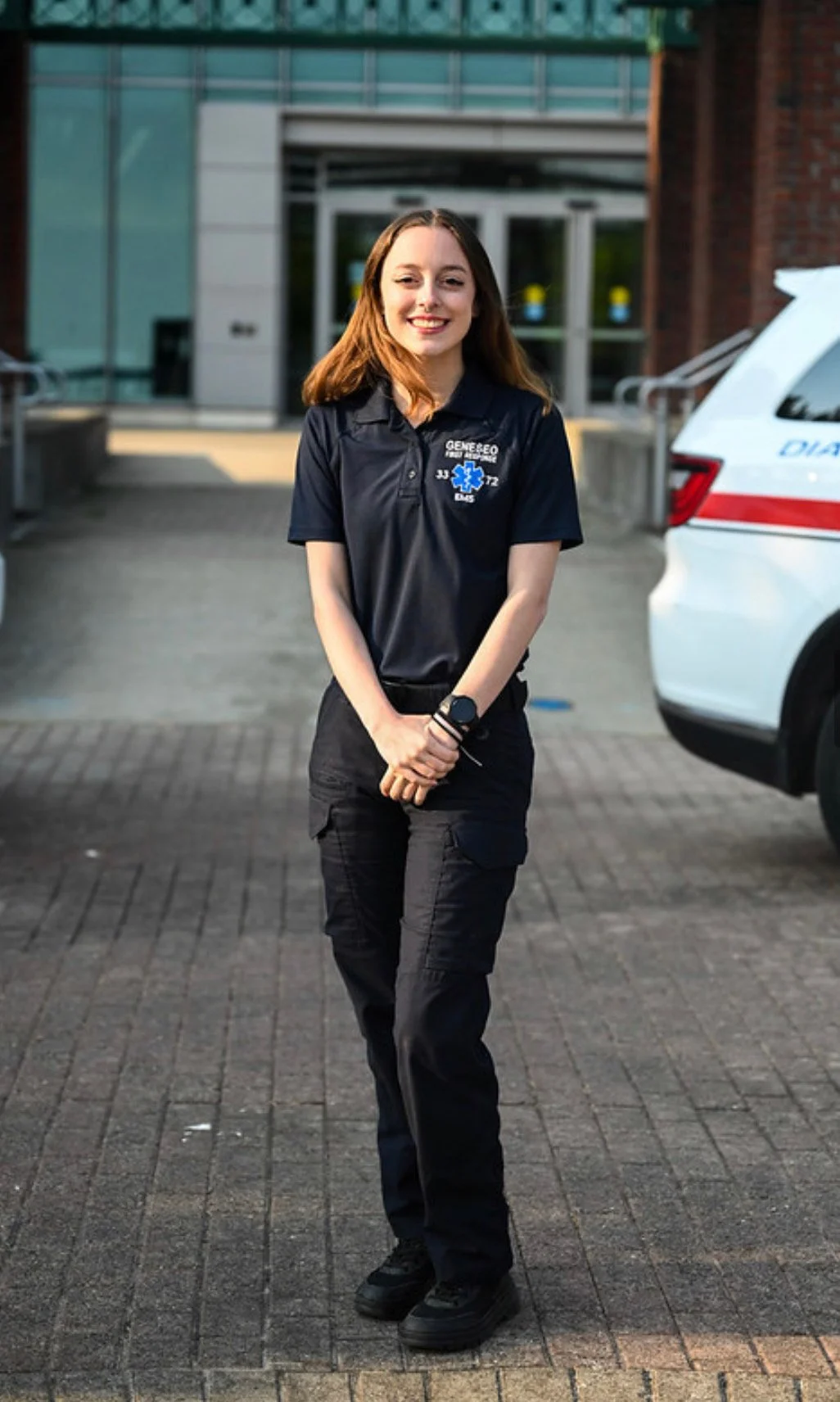Invasion of Privacy: EMT Chief of Operations Kayla Storie
Photo courtesy of Kayla Storie
Students like Kayla Storie provide unique resources to Geneseo students and help to ensure that students feel safe and get the help that they need on campus.
Kayla Storie is a senior socio-medical and biology double major and an emergency medical technician (EMT) on the Geneseo campus. She is also the Chief of Operations of Geneseo First Response (GFR); “Chief of Operations for us is kind of the overarching term for the person who looks after and oversees all the other e-board positions.” Storie explains that her position “spans across clinical and non-clinical operations of our management, and then also just communication with teams that aren't our own.”
Storie is in charge of communicating with campus administrators, the University Police Department (UPD), and the Department of Planning, through which she plans events and other on-campus organizations, talks to student affairs, and then to non-campus organizations. “We're also managed by a county operations system. We operate within the regional protocols, just like any other [emergency medical services] EMS agency. That means I go to the captain's meetings that all other EMS agencies go to, and we share our updates.”
Storie explained how she became interested in EMT work. “I came to Geneseo, wanting to do this. I thought it was really cool. Growing up, my uncle and my aunt were EMTs, and they worked in New York City. He's a firefighter. It seemed so cool to me. And I was like, wow, I want to do that.” Storie joined her second semester, freshman year, and loved it. “I loved EMT class. I went on to get a real job in EMS, not just volunteer because I love it so much, but I've always wanted to do something medical and hands-on.”
Stroie admits that her socio-medical and biology majors have helped her in her EMT journey. She explained, “We have people from all sorts of backgrounds, all sorts of majors, and all of them are successful.” She goes on, “It's just motivation and discipline and wanting to show up and wanting to learn. People who are interested in learning and want to be lifelong learners do the best in all medicine.”
Storie explained that while being an EMT, you are constantly still learning. “You'll see different things all the time. And even though I've been an EMT for over two years, I still go on calls where I'm like, wow, I've never seen that before. You have to want to leave there and do research and, like, learn more.”
The EMTs operate on campus daily; their borders are the campus and anything the campus owns or that falls under campus property. “Even if the roads are on the outside of campus like we don't go to them, people get confused about it. For example, we don't go to Orchard, and we don't operate outside of campus.” If there is a severe emergency, campus EMTs are allowed, and occasionally, they are requested off campus to provide the first response to that emergency.
I asked Storie if there were any misconceptions about Geneseo’s EMTs. “I think there are just a lot of misconceptions that we don't need to be prepared for calls and that serious things don't happen on campus.” Storie continues, “And not to say every day there's something terrible happening on campus. I don't mean to make it sound that way, but our members do respond to serious medical emergencies, just like you would anywhere else.”
Storie would like to clear up some misinformation regarding what they can and can not do on campus.“People might have a misconception that we just kind of pick up drunk people. Yeah, that happens, but you know, I think we do serve an important role on campus. And you know, sometimes we wait almost 40 minutes for an ambulance to show up.”
Storie explains that EMTs do not transport people and, therefore, can not bring people to the hospital. “I wish we could, but imagine those people being alone for 30 to 40 minutes waiting for an ambulance instead of being supported by people who know what they're doing and can do a lot.”
Storie also hopes students on campus care better for each other to avoid emergencies. “We're responding to emergencies because people didn't take care of each other, like, just didn't care enough to check in on each other, didn't check in, just dropped them off to their dorm room and left.”
Being completely honest with EMTs when they help during emergencies is essential. “Neither we nor UPD are ever looking to respond to a medical emergency to get anyone into trouble, we have to ask hard questions sometimes, and honest answers are the best way to move forward.”
An important question Storie finds herself asking is, “Hey, did you do any drugs while you were out? And, like, the UPD officers will literally be like, dude, I'm covering my ears.” First responders are not here to judge or to get you in trouble. They want you to be safe and are there to help you. “We're not trying to get the juicy deeds, but we don't really care. But it's really important to our job to know what's exactly going on.”
Though you can not contact the student EMTs directly in an emergency setting, “if you contact UPD emergency or non-emergency and they find that you have a medical emergency, we're always summoned to those, or if you just call 911 directly.” If you have a medical emergency or a medical problem, EMTs will be called as long as you are on campus.

